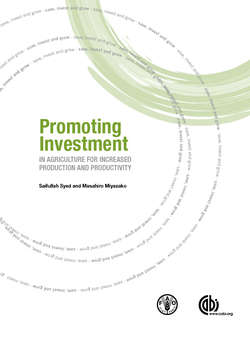Читать книгу Promoting Investment in Agriculture for Increased Production and Productivity - Saifullah Syed - Страница 4
На сайте Литреса книга снята с продажи.
Foreword
ОглавлениеInvesting in agriculture is one of the most effective ways of reducing hunger and poverty, promoting agricultural productivity and enhancing environmental sustainability. However, for any investment to have a positive impact on agricultural production and productivity, it must contribute to capital formation at the farm level. In this respect, investments made by the farmers themselves are indispensable. Their investments constitute the foundation and the engine for sustainable development and the reduction of poverty and hunger.
For farmers, the main sources of investment finance are their own savings and their fixed capital, which are used as collateral for credit. Capital formation is certainly higher for farming households with positive savings and clear, legally recognized ownership of their land. In areas where the levels of poverty and hunger are high and agriculture is dominated by small-scale farmers, such as in South Asia, sub-Saharan Africa and parts of Latin America, the average farmer earns less than half of what is needed to cross the poverty line. For small and marginal farmers with below average land holdings, the situation is even worse, both in terms of their ability to save and to secure their rights to the land.
Apart from the capacity to invest through the generation of savings and fixed assets, the factors driving investment for farm-level capital formation are the growth of the food value chain from producers to consumers, which includes agro-industries and the provision of public goods in the form of basic infrastructure, such as roads, electricity, education and technology. There is no doubt that more public resources are needed for agriculture. However, there is a need for new investment strategies that are centred on agricultural producers and focuses public resources at all levels on the provision of public goods in ways that complement investments made by farmers and support inclusive and efficient agricultural and food systems at local and national level.
To address these issues, in October 2009 FAO initiated the project: Study on Appropriate Policy Measures to Increase Investments in Agriculture and to Stimulate Food Production (GCP/GLO/267/JPN) with contribution from the Ministry of Agriculture, Forestry and Fisheries (MAFF) of Japan. This document presents findings from its project activities.
The report seeks to build a better understanding of the relationship between savings and investment at the farm level, domestic and foreign corporate private investment in agriculture and agro-industries and the public sector investment in developing countries. It proposes policies and a programme of action for creating conditions under which domestic savings, farm-level investments and investment in agro-industries are united in a self-perpetuating, virtuous cycle that can be described as ‘save, invest and grow’.
LAURENT THOMAS
Assistant Director-General
Technical Cooperation Department
